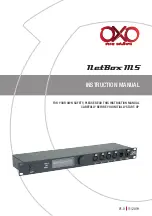
E6581158
E-20
5
+
Motor constant must be set
If the motor you are using is a 4P Toshiba standard motor and if it has the same capacity as the inverter,
there is basically no need to set the motor constant. In any other case, be sure to set the parameters
H
to
H
properly.
Be sure to set
H
(rated current of motor) and
H
(rated speed of motor) correctly, as specified on
the motor’s nameplate. For the setting of
H
(no-load current of motor), refer to the motor test report.
There are three procedures for setting the other motor constants.
1) The sensorless vector control and motor constants (auto-tuning) can be set at a time.
Set the basic parameter
CW
to
.
⇒
For details, see 1 in 5.2.
2) The motor constant can be automatically set (auto-tuning).
Set the extended parameter
H
to
.
⇒
For details, see selection 2 in 6.17.
3) Each motor constant can be set individually.
⇒
For details, see selection 3 in 6.17.
5) Energy-saving
Setting of V/F control mode selection
RV
to
(automatic energy-saving)
Energy can be saved in all speed areas by detecting load current and flowing the optimum current that fits
the load.
+
Motor constant must be set
If the motor you are using is a 4P Toshiba standard motor and if it has the same capacity as the inverter,
there is no need to set the motor constant. In any other case, be sure to set the parameters
H
to
H
properly.
Be sure to set
H
(rated current of motor) and
H
(rated speed of motor) correctly, as specified on
the motor’s nameplate. For the setting of
H
(no-load current of motor), refer to the motor test report.
There are three procedures for setting the other motor constants.
1) Automatic energy-saving operation and a motor constant can be set at once. Set the basic parameter
CW
to
.
⇒
For details, see 1 in 5.2.
2) The motor constant can be automatically set (auto-tuning). Set the extended parameter
H
to
.
⇒
For details, see selection 2 in 6.17.
3) Each motor constant can be set individually.
⇒
For details, see selection 3 in 6.17.
6) Achieving further energy savings
Setting of V/F control mode selection
RV
to
(dynamic automatic energy-saving)
More substantial energy savings than those provided by setting
RV
to
can be achieved in any speed
range by keeping track of the load current and passing a current appropriate to the load. The inverter cannot
respond to rapid load fluctuations, so that this feature should be used only for loads, such as fans and
pumps, that are free of violent load fluctuations.
















































